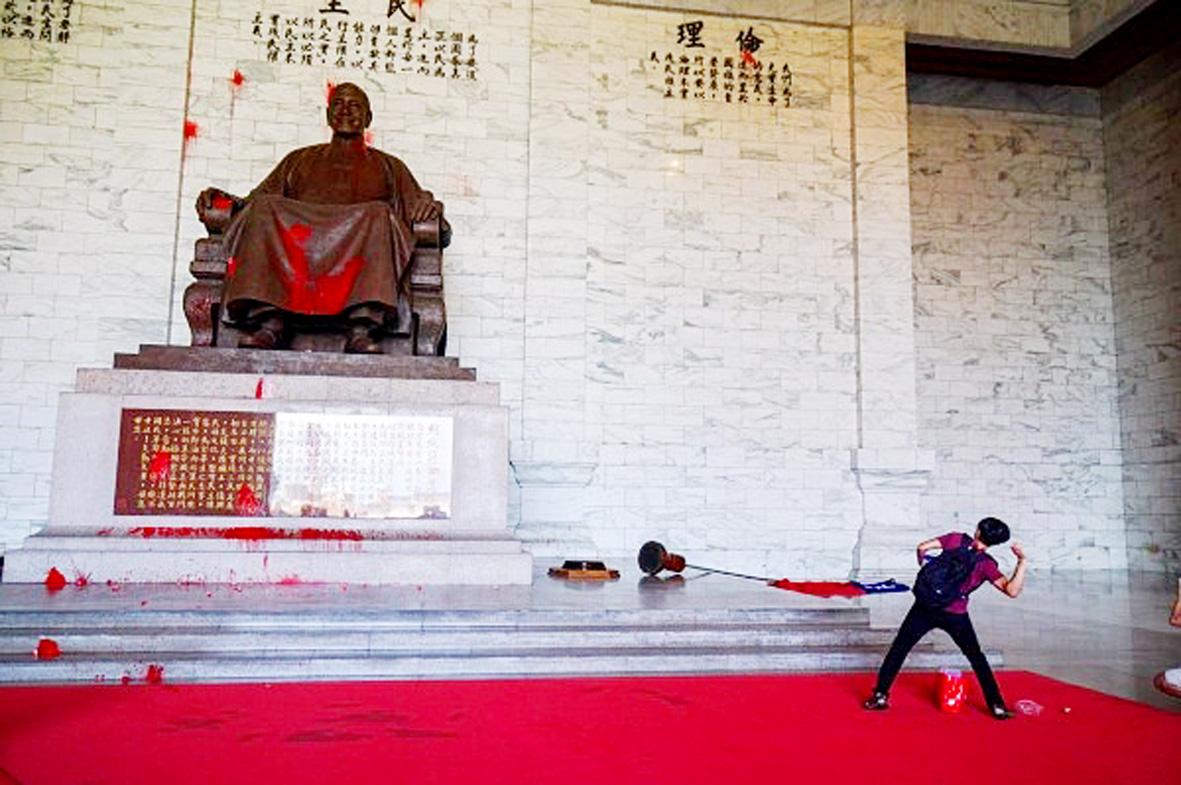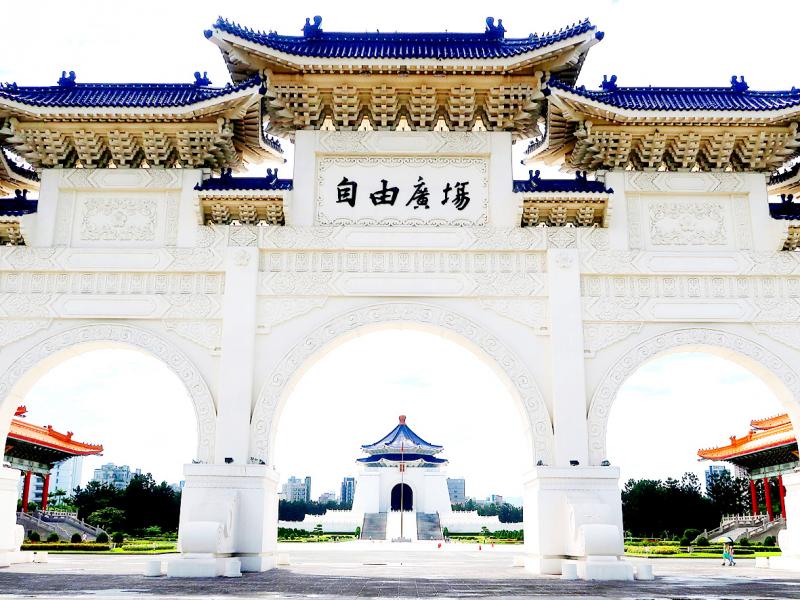Last week the Transitional Justice Commission proposed taking down the statue of Chang Kai-shek (蔣介石) at Chiang Kai-shek Memorial Hall in central Taipei. It depicted the move as part of a plan for excising markers of authoritarianism from the park.
The most important task, the commission said, would be removing the hall’s “axis of worship,” the 6.3m-tall bronze statue of Chiang.
Let us hope that if and when that obscenity is finally removed from the memorial, it is placed in the famed Cihu Memorial Sculpture Garden in Taoyuan’s Dasi District (大溪), where it can be properly mocked for all eternity.

Photo: Chen Yu-fu, Liberty Times
CHIANG, CHIANG, EVERYWHERE
Removing markers of the authoritarian era should start, of course, with names. Chiang’s personality cult, recounted in Jeremy Taylor’s “The Production of the Chiang Kai-shek Personality Cult, 1929–1975” (China Quarterly, 2006), remains stamped across Taiwan’s physical and political spaces, like a ranch brand on cattle.
Almost all the nation’s cities host a Zhongzheng Road (中正路), named after Chiang. Keelung and Taipei boast Zhongzheng (中正) districts. No mere indicators of Chiang’s power, these names from China are markers of a colonial regime that reshaped the island’s life to its own ends.

Photo: Chen Yu-fu, Liberty Times
Visitors often wonder why the street names haven’t been changed. For a street name change, under the law, a vote must be held by the individuals owning addresses on the street. Since few people will vote to undertake changing every piece of paper that defines their lives, perhaps reviving old property disputes and certainly necessitating scores of encounters with Taiwan’s bureaucracy, changing street names is almost impossible.
Thus the ancien regime remains a current presence.
Another signifier of Chinese Nationalist Party (KMT) power that needs to be scrubbed is place names in the mountains. Taiwan’s Aboriginal areas are marked with silly names relating to rebuilding the Republic of China (ROC) or “peace,” as if invoking sympathetic magic to keep the locals from rebelling against authoritarian power. The legislature needs to get moving on reverting all of those to place names used by the local indigenous peoples.
While they’re at it, our politicians should at least consider the idea of removing words like fan (番), “savage,” from place names across Taiwan. KMT colonialism, after all, is simply a subset of Han settler colonialism. The two must be addressed together.
It goes without saying that government and government-owned entities with the word “China” in their names need rectified.
VESTIGES OF AUTHORITARIANISM
Cleaning the veneer of authoritarian power is only the beginning. Too many of Taiwan’s organizations and structures retain the frameworks of authoritarian power, making them dangerously easy to revert.
For example, the educational system, in many ways still a relic of the authoritarian era, needs massive changes. The idea that students are in a “class” for years with the same students, originally a way to make surveillance more convenient, should be done away with.
The struggle over the Chiang statue and the status of the Hall, which has waxed and waned since the administration of president Chen Shui-bian (陳水扁) changed the name of the memorial, is often depicted as a conflict over the legacy of authoritarianism in Taiwan, but it is much less than that.
This “debate” is, rather, a noisy avoidance of that conflict, a sign that KMT leaders have won the real fight.
CHIANG CHING-KUO’S LEGACY
What is the function of all this talk? The Chiang statues are endlessly discussed, obscuring the silence about markers and memorials relating to Chiang Ching-kuo (蔣經國), his brutal but far more competent son. As I have noted elsewhere, the popularity of the younger Chiang functions as a kind of psychic compensation for the absurd and groundless veneration of the father, Ching-kuo being the Chiang that, in today’s society, it is okay to admire.
Other markers of authoritarian power, such as statues to politicians who lived out their lives in China — who is ROC President Lin Sen (林森) to Taiwan history? — remain almost a non-issue. The numerous ROC martyr’s shrines live on, undisturbed.
Like the innumerable Confederate monuments in the US, they are victory markers, memorializing the triumph of colonial power over local democracy even in the face of military defeat. The KMT may have lost the war in China, but it won the peace in Taiwan: it obliterated Japanese colonial markers and suppressed the island’s democracy.
The function of the Chiang statue debate is not to clarify, but to occlude. It gives the green camp a way to look like it is sticking it to the pro-China side, while the pro-China side can rally its base. In today’s politics, that’s what passes for a win-win situation.
Indeed, KMT Chairman Johnny Chiang (江啟臣) went to town on the proposal, saying of President Tsai Ing-wen (蔡英文): “She is not only an authoritarian leader over a one-party state, but also an admitted publicly elected dictator… Does she not need to reflect on herself? Stepping down is better than tearing down statues.”
The semiannual ritual debate over the statue is a case of justice delayed. Of justice denied.
The commission has laudably released documents from the White Terror era. It has exonerated many imprisoned and killed for political reasons by the regime (did anyone think they were guilty of a crime?). It has embarrassed the KMT. These are good things.
Yet, it is 2021. Not a single person has been punished for the thousands of dead, for those tortured and imprisoned and exiled, for the five decades of authoritarian control. Instead, we are talking about a statue that should have been banished two decades ago. Our democratic transition remains, as Naiteh Wu (吳乃德) wrote in 2005, a transition without justice.
The dead cry out for justice. Still.
Notes from Central Taiwan is a column written by long-term resident Michael Turton, who provides incisive commentary informed by three decades of living in and writing about his adoptive country. The views expressed here are his own.

Towering high above Taiwan’s capital city at 508 meters, Taipei 101 dominates the skyline. The earthquake-proof skyscraper of steel and glass has captured the imagination of professional rock climber Alex Honnold for more than a decade. Tomorrow morning, he will climb it in his signature free solo style — without ropes or protective equipment. And Netflix will broadcast it — live. The event’s announcement has drawn both excitement and trepidation, as well as some concerns over the ethical implications of attempting such a high-risk endeavor on live broadcast. Many have questioned Honnold’s desire to continues his free-solo climbs now that he’s a

Lines between cop and criminal get murky in Joe Carnahan’s The Rip, a crime thriller set across one foggy Miami night, starring Matt Damon and Ben Affleck. Damon and Affleck, of course, are so closely associated with Boston — most recently they produced the 2024 heist movie The Instigators there — that a detour to South Florida puts them, a little awkwardly, in an entirely different movie landscape. This is Miami Vice territory or Elmore Leonard Land, not Southie or The Town. In The Rip, they play Miami narcotics officers who come upon a cartel stash house that Lt. Dane Dumars (Damon)

Francis William White, an Englishman who late in the 1860s served as Commissioner of the Imperial Customs Service in Tainan, published the tale of a jaunt he took one winter in 1868: A visit to the interior of south Formosa (1870). White’s journey took him into the mountains, where he mused on the difficult terrain and the ease with which his little group could be ambushed in the crags and dense vegetation. At one point he stays at the house of a local near a stream on the border of indigenous territory: “Their matchlocks, which were kept in excellent order,

Jan. 19 to Jan. 25 In 1933, an all-star team of musicians and lyricists began shaping a new sound. The person who brought them together was Chen Chun-yu (陳君玉), head of Columbia Records’ arts department. Tasked with creating Taiwanese “pop music,” they released hit after hit that year, with Chen contributing lyrics to several of the songs himself. Many figures from that group, including composer Teng Yu-hsien (鄧雨賢), vocalist Chun-chun (純純, Sun-sun in Taiwanese) and lyricist Lee Lin-chiu (李臨秋) remain well-known today, particularly for the famous classic Longing for the Spring Breeze (望春風). Chen, however, is not a name